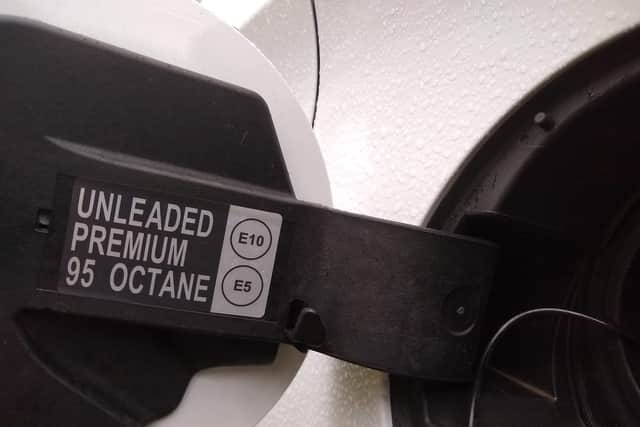1 in 4 drivers still in the dark about E10 fuel as new cleaner petrol is rolled out
and live on Freeview channel 276
A quarter of drivers are unaware that the UK’s standard unleaded petrol is changing this month, with a similar number yet to check if their car is one of around 600,000 unable to run on the fuel.
From September, E10 petrol is replacing E5 as the regular unleaded grade at filling stations around Britain.
Advertisement
Hide AdAdvertisement
Hide AdHowever, the RAC found that 24 per cent of drivers were unaware of the changes and 27 per cent hadn’t checked if their vehicle is compatible with the new fuel.
The new petrol features a higher blend of bioethanol - up to 10 per cent compared with the previous standard’s five per cent - and is designed to reduce the CO2 emissions of vehicles. The Department for Transport estimates that the switch from E5 to E10 petrol could cut the UK’s carbon emissions by 750,000 tonnes a year - equivalent to removing 350,000 cars from the road.


While most modern cars can run on E10 without problems up to 600,000 older models, including 350,000 pre-2000 daily drivers as well as vintage and classic cars, are at risk of damage from its higher ethanol content.
RAC head of policy Nicholas Lyes warned that drivers of older incompatible cars would face higher fuel bills in future and could struggle to find suitable fuel near them.
Advertisement
Hide AdAdvertisement
Hide AdHe said: “E10 petrol has already started appearing on forecourts to replace the old E5 blend, and that process will continue at pace in the coming weeks.
“But while the vast majority of drivers of petrol cars aren’t affected, a sizeable minority will be and the only way to be sure is to use the official online checker.
“Those that discover their cars aren’t compatible will unfortunately need to seek out and pay for a hefty premium for E5 super unleaded fuel instead. The cost of doing this could quickly add up for people who need to use their cars regularly.
“Drivers who will continue to rely on E5 will also need to make sure the filling station they’re visiting stocks the fuel in the first place, or risk running out of fuel and having to call on their breakdown provider.
Advertisement
Hide AdAdvertisement
Hide Ad“We’d also like to remind owners of classic cars that they need to be careful not to accidentally top up with E10 and then leave it sitting unused in the tank for long periods, something which can lead to expensive damaged plastics, metals and seals.”
Jim Holder, editorial director of What Car?, emphasised that the new fuel would not be a problem for the majority of motorists.
He said: “While much has been said about 600,000 cars, mostly very old models, being unable to use the new fuel standard, it’s important to note this represents just a fraction of the 31 million registered cars on UK roads, and that high, 97 octane petrol will still suit these vehicles.
“Biofuels are an important tool in helping reduce transport related emissions.
Advertisement
Hide AdAdvertisement
Hide Ad“However, to highlight how global standards vary and how long such initiatives take to roll-out, the switch comes at the same time as the UN Environmental Programme celebrates the end for leaded fuel use around the world – a petrol standard that was banned in the UK more than 21 years ago.”
